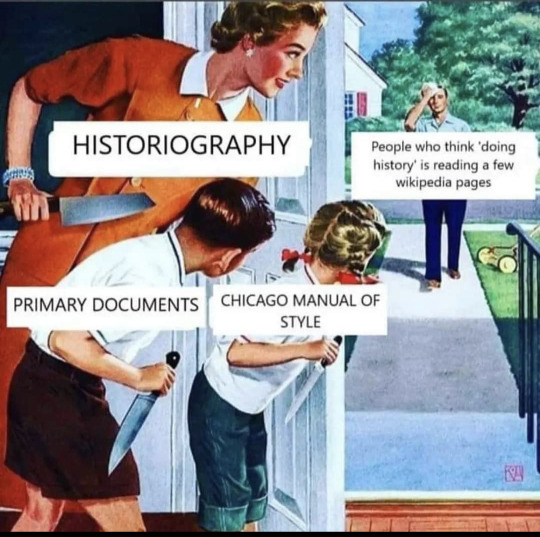#historiographie
Text
Pour la défense du terme "réaction (thermidorienne)"
Voici une section d'un article que je suis en train de faire à partir de la 4e partie (encore inédite) de ma thèse, que je viens de rédiger et qui va sans doute finir par être réduite de beaucoup, mais que je pense pouvoir intéresser mes abonnés ici. Il s'agit d'une réflexion sur la pertinence du terme "réaction (thermidorienne)".
Grosso modo, je suis plutôt d'accord avec l'idée qu'utiliser "Réaction thermidorienne" pour désigner la période 9 thermidor an II-4 Brumaire an IV n'est pas génial, parce que cela ignore les mois de flottements et de luttes politiques de la fin de l'an II et du début de l'an III (je préfère parler de la période de la "Convention thermidorienne"), mais je pense qu'il est insensé de prétendre que le projet politique qui a fini par triompher au cours de cette période n'était pas réactionnaire :
À l’instar des critiques de l’usage de « la Terreur », que ce soit comme désignant d’une « politique[1] » cohérente ou simple chrononyme, d’autres termes traditionnels connaissent en ce moment historiographique une remise en question salutaire. Celui de « Réaction thermidorienne » en fait partie. Comme le dit Michel Biard en parlant des désignants des acteurs, « « thermidorien » n’a aucun sens précis, « réacteur » est abusif puisqu’on ne peut réduire la période qui suit Thermidor à une « réaction » au sens politiquement piégé du mot[2] ». On ne peut qu’être d’accord avec Biard sur premier terme. Le problème du mot « thermidorien » — qui peut s’appliquer tant aux personnes ayant participé au coup d’État parlementaire du 9 thermidor ou qui y ont adhéré après, qu’à celles qui en profiteront par la suite pour dénoncer et renverser les politiques adoptées au cours de 1793 et de l’an II — est connu depuis longtemps.
Néanmoins, l’usage continué du terme de « réacteur », qui a précisément été adopté pour différencier les individus de la seconde catégorie de ceux du premier, et avec lui de « réaction », me paraît justifié à trois titres. D’abord, comme il s’agit d’un terme d’époque, il peut être utile pour comprendre l’état d’esprit de ceux qui l’employèrent. Mais au-delà de ce premier type d’usage, et sans vouloir englober toute la dernière séquence de la Convention à partir du 9 thermidor dans le terme de « Réaction », ce qui serait effectivement abusif, il y a fondamentalement un processus de « réaction » au premier sens du mot à l’œuvre puisque il y eut chez beaucoup de conventionnels une volonté affichée (quoique sélective) de revenir sur l’œuvre des mois précédents. Ensuite, le terme de « réaction » au sens fort du terme, non comme chrononyme, mais pour désigner la politique d’abandon des mesures et jusqu’aux principes démocratiques, sociaux et jusnaturalistes de 1793-an II, et de « réacteur » pour désigner ceux qui soutenaient un tel projet politique, me paraît adapté. On peut reconnaître la complexité de la « réaction » contre une « terreur » construite de façon à imbriquer aussi étroitement violence et participation populaire, de façon cynique chez les anciens Montagnards et sans doute beaucoup plus sincère, tant le lien leur paraissait naturel (leurs propres expériences semblant confirmer les écrits des auteurs anciens hostiles à la démocratie) chez les « Brissotins » réintégrés. On peut même se demander comment situer par rapport à ce terme les démocrates qui ont participé à la construction de l’épouvantail « terroriste » en croyant ne s’opposer qu’au volet répressif des politiques de 1793-an II mais qui finirent par dénoncer la « réaction ». Néanmoins, on ne peut comprendre une période qui vit l’abandon de la constitution de 1793 en faveur de celle qui fonda le Directoire, qui réprima la gauche et anéantit le mouvement populaire, sans pouvoir nommer le projet politique antidémocratique, antisocial et donc réactionnaire qui fut la cause de ces retournements, et ceux qui en étaient porteurs.
[1] Patrice GUENIFFEY, La politique de la Terreur, 2000.
[2] Michel BIARD, Les derniers jours de la Montagne, 2023, p. 23.
44 notes
·
View notes
Text
The first rule of studying history is to always try to look for primary sources to check your information, and remember that even those have to be examined critically
The second rule of studying history is that a person can be both one of the worst people to ever walk the earth and a babygirl
Hope this helps!
#follow for more useful tips etc etc#history shitposting#history memes#history#historiography#tagamemnon#frev#ancient rome#roman republic#roman empire#frev memes#hall of fame
1K notes
·
View notes
Text
What with Federation culture being so bent for historical recreation and holodeck malfunctions spawning sapient holograms left and right, I have to imagine at least one of those inadvertently sapient holograms themselves went on to become a historian. Imagine one of those inadvertently sapient holograms studying their own namesake and coming to the conclusion that the present academic consensus – upon which they themselves are based – is incorrect. Imagine hologram Genghis Khan rocking up to the podium at the historical society symposium like "you fuckers got my personality all wrong and I'm going to make it everybody's problem".
4K notes
·
View notes
Text
Ramer dans le sable
Deux mois qu'on est sur le projet collectif de valorisation et j'en peux plus. Ce truc n'a pas de fin.
Non content de nous forcer à travailler tous ensemble,
de nous mobiliser sur un sujet que la contrainte rend assommant,
de nous enchaîner à la digestion de 12.000 articles + ton poids en livre,
et de nous demander de fabriquer de la vidéo, alors même qu'on n'a pas été autorisés, par la cheftaine de la classe, à s'approcher de la table de montage,
il faut en prime qu'on se tape la rédaction d'un mémoire commun (alors que la mémoire doit précisément être la dernière chose qu'on a en commun, mes camarades et moi)

Je pensais m'en être sortie en choisissant les parties les plus "compétence professionnelle" du bottin (présentation du fonds d'archives + budget).
Je me suis réjoui trop vite...

#historiographie#n'est pas un nom de maladie#projet collectif sa mère#broad city#ilana glazer#abbi jacobson#my gif#hommage#détournement#vis ma vie d'étudiante#reprise d'études#survivre en master#gauvain#kaamelott
0 notes
Text
The long history of the Egtved Girl's dress
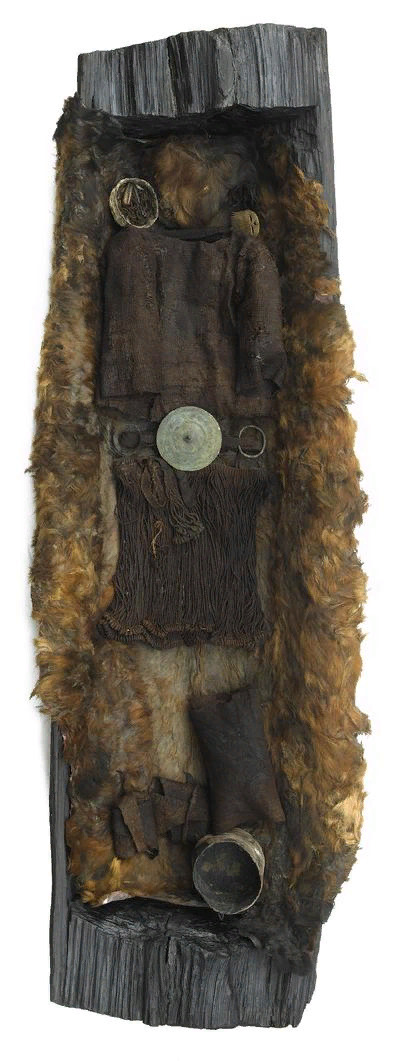

The Egtved Girl's burial (1370 BC) // The archaeologist's sketch after the excavation (1921)

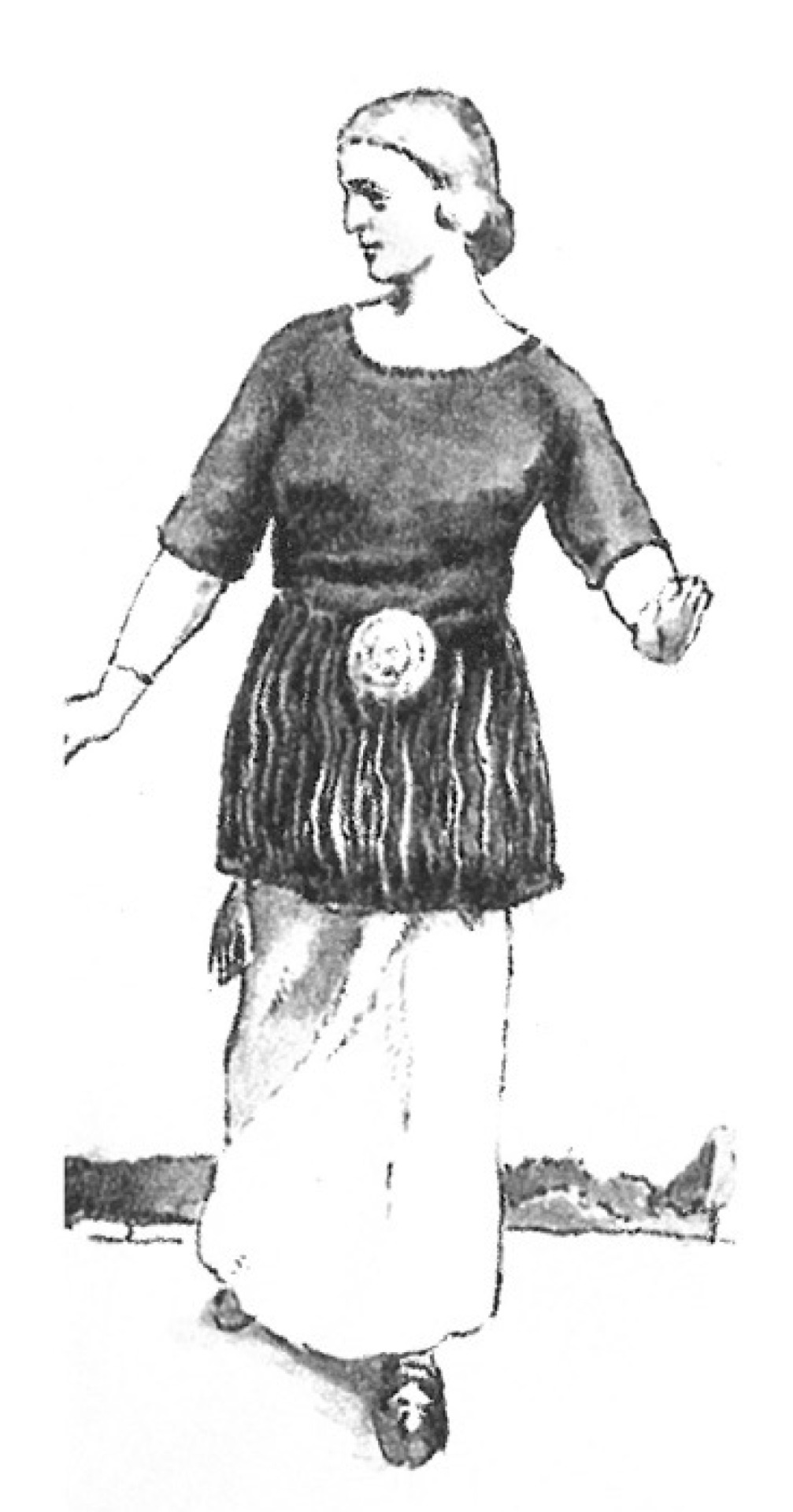
Lise Fenger. The first attempt at reconstruction of the dress (1938) // An illustration from "Das Kostüm Werk" by Wolfgang Bruhn, Max Tilke (1941)


An illustration by Aage Sikker Hansen (1944) // Anni Brøgge performing a ritual dance, photo by Flemming Kaul (1999)


Modern reconstruction for the National Museum and Sagnlandet Lejre
Despite being preserved in almost perfect condition, the Egtved Girl's (c. 1390 – c. 1370 BC) clothes have been a controversial topic for an entire century. Because of how unexpectedly revealing (for our expectations) they look, these Bronze Age top and skirt's depictions have been repeatedly changed to be more "modest" and better fit the 20th century's sensibilities. Only by the end of the 1990s, Egtved Girl's clothes have been reconstructed accurately.
Sources:
The Egtved Girl
Spor fra Metallernes tid
Crop top er ikke nyt i Jylland
Bronze Age dance
#egtved girl#history#mummies#photography#art#illustration#clothes#fashion history#historical reconstruction#stereotypes#censorship#death#historiography#culture#prehistory#added some text for clarity#archaeology#my post
798 notes
·
View notes
Text

*crying*
#uquiz#the iliad#the odyssey#this is super good pls do it#i just dont have any better tags#also watch troy: fall of a city#its the best of the inevitably bad adaptations#i could go on about the importance of the Iliad to modern understanding of history anthropology and historiography for ages#but i wont do that to yall so in the meantime ship patrochilles#and remember that achilles is a bottom#but most importantly helen didnt deserve this shit
1K notes
·
View notes
Text
Deux comptes rendus de mon livre "La République de Prieur de la Marne"
Celui de Biard est... prévisible. Pas négatif, loin de là, mais il n'a pas vraiment saisi le fond de ma démarche. Et en plus il aurait été sympa d'avoir la perspective de quelqu'un qui n'avait pas déjà fait partie de mon jury de thèse.
En revanche, j'ai été agréablement surprise par celui de Paul Hanson pour H-France (en anglais).
10 notes
·
View notes
Text
I have a new uquiz for you, go on a pilgrimage with me. discover who you are.
#don't you want to go on a nice medieval pilgrimage?#don't you want to rest a little? answer some questions? learn something about yourself?#this was originally a pentiment medieval quiz and now it's this#it's pretty good imo though. i had a lot of fun researching it#yes there really is a biblio. ill write it up soon but its parts of the pentiment biblio plus some stuff i found myself#really thank you to everyone who made pentiment. you know how sometimes you find a piece of art at exactly the right time?#well i discovered pentiment just as my interests perfectly intersected with it. (those interests being history historiography and grief)#have fun etc. tag your results#that's always great#quiz#uquiz#pentiment#medieval#mine#sorry for being absent for a bit. holidays kind of suck#sorry abbie i couldnt fit the saw bathroom in thisone. i couldn't think of a way to do it naturally#i listened to SAVED! and SINNER GET READY the entire time i was writing this so yeah there's a ref. sue me
490 notes
·
View notes
Text
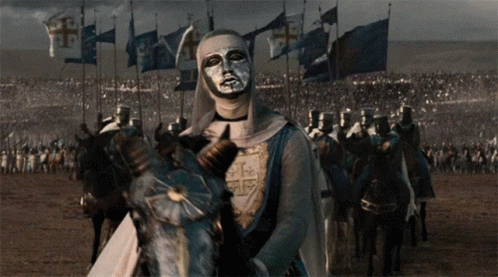
"Young Baldwin seems to have possessed a naturally strong constitution, and he was also gifted with undeniable qualities of character and a strong, lively intelligence. William of Tyre, who was his tutor, says that 'in his childhood he was very handsome, with a quick and open mind, and he rode very well, better than his forebears had done.' 'Never forgetting an injury, and still less a kindness,' he had 'a retentive memory, was well educated with an excellent memory for tales and a fondness for telling them.'
The child must have realized very early that his disease was incurable, and his reaction shows great strength of character. He wanted to forget and make everyone else forget, right up to the end, that he was sick. But by the time King Amalric died, young Baldwin's disease had made such progress that it was already beginning to show, and 'the people of the kingdom felt great grief when they looked at him.'
From 1175 onward, the regent and the barons of Jerusalem were able to count on an unexpected ally, and a more valuable one than might have at first been thought. At fourteen years the young King Baldwin emerged as an intrepid fighter, capable of leading his troops into battle and later on of commanding them personally in the field. He was seen at the side of the constable and the Count of Tripoli, riding at the head of his troops and taking part in raids and diversionary campaigns [...]. At the time the King was still too young to actually command his army, and his principal function was as a symbol and an inspiration for his men. They were all happier marching under command of their lawful King. Young though he was, he was like the flag, to be protected and followed through the thickest of the fight, and he was not afraid of personal danger. [...]
When he came to the throne, he had [...] been a leper for ten years, and although the disease did not begin to make rapid strides until puberty, it must, even in early adolescence, have weakened and exhausted him. It is unlikely that anyone would have dared to reproach him had he wished to consider himself an invalid, yet he behaved as though he were perfectly well.
He had been educated, as became a prince, by knights and masters of arms and also by churchmen [...], and these had not failed to teach him patience and prepare him for the harsh trial that was to be his life, and to arouse in him a sense of duty and pride in being, despite his infirmity, King of Jerusalem and Defender of the Holy Sepulcher. Whether as a result of education or temperament, Baldwin IV seems to have had little inclination to self-pity. The young King overcame his illness with all the determination of an adolescent who knows he is physically weak and is bent on proving to everyone, himself included, that he can equal and even surpass others. He may have been a king who had the misfortune to be a leper, but he was also a leper lucky enough to be a king.
He loved power because it was all life had to offer him, and he very early evinced a wish to govern by himself, and would not tolerate disobedience. A temperament of this kind can easily degenerate into tyranny and capriciousness in one so young, but Baldwin IV had a lively and precociously mature mind, and was sincerely concerned to do his best for the good of the kingdom; and this right up to the time when his sufferings began to drive him out of his mind. [...] Up to the last moment he wanted to be a king and a general, and he wanted to be obeyed. It was his way of clinging to life, and he was a terrible fighter."
- Zoé Oldenbourg, The Crusades (1966)
#i have been reading old books again and oldenbourg's unabashed baldwin fangirling is too delicious not to share#like girl you're supposed to be writing a history book not fanfiction#baldwin iv#historiography#kingdom of heaven 2005#crusades#zoe oldenbourg
268 notes
·
View notes
Text
I don't want to sound like an apologist for anything but I feel like it should be acknowledged that the question of morality in different periods of history is complex and not easy to answer.
If you do say things like 'marrying an underaged person was totally okay back in the 1700s so what they did was totally fine actually' it definitely does ring alarm bells (as it should!)
That is not the exactly the same thing as saying 'considering the historical context of the era this person lived in, their behaviour would have likely not been considered too far out of the ordinary'. And I believe you can probably replace this with people's views of slavery or domestic violence and get to a pretty similar thing.
Is it dark and depressing? Sure. It's also, to the best of my knowledge, often fairly accurate.
I mean, I would have to do an actual research on this particular question to make any more definite statements. But just look at Ancient Greece's societal norms concerning relationships. That is definitely a challenge any historian needs to grapple with, but saying that every other man living at that time was a monster just isn't very useful, and doesn't feel like great academic work either.
Sometimes you would need to take a step back and try to look at these issues with more of a dispassionate curiosity to try and understand them. (As with Ancient Greece - what role did these relationships served? How did they influence the Greek culture? The structure of Greek society? etc.) That doesn't mean you renounce your own sense of right and wrong.
I feel like the best approach would be to acknowledge your modern perspective and clearly mark it in the text (something like 'by our modern standards, this would of course be seen as...' or even focus on writing articles from the perspective of the affected/opressed). But then also write about the way such behaviour would have been viewed in the time it took place. This does not, in my opinion, excuse the behaviour - it just helps to put it in the necessary context.
The bonus of this approach is that it allows the historian to highlight when someone's behaviour is genuinely considered morally reprehensible even by the standards of the time (something like 'even in a misogynistic society, his treatment of women was marked as particularly reprehensible' -> well better than that but it's also midnight, I'm tired and I'm sure you get my point).
There is also the possibility that some behaviour that is considered totally okay today will be seen as completely reprehensible by someone reporting on it hundreds of years from now. Something to keep in mind as a historian.
TL;DR definitely don't want to excuse any problematic behaviour but I think we should treat the question of moral norms in history as the complex and difficult issue it is, rather than jumping to conclusions
(also saying that someone's opinion is automatically unworthy because they haven't taken history classes at a university level just feels kind of elitist. Sure, an understanding of historiography and a critical approach are incredibly important, but it is not impossible to get at least the basic idea just from your own reading. And in any case, it is better to explain it rather than to dismiss the person's opinion altogether.)
#history#rant#historiography#frev#discourse#should lay off the coffee probably#might delete in the morning if I read it again and don't understand what I've been trying to say#ramblings
140 notes
·
View notes
Text

#history#primary sources#historiography#it’s hard work but someone’s gotta do it#historians#that rely mainly on secondary sources#naive or lazy historians that take primary sources at face value!
166 notes
·
View notes
Text
Wild how we know that Elizabeth Woodville was officially appointed to royal councils in her own right during her husband’s reign and fortified the Tower of London in preparation of a siege while 8-months pregnant and had forces gathering at Westminster “in the queen’s name” in 1483 – only for NONE of these things to be even included, let alone explored, in the vast majority of scholarship and historical novels involving her.
#lol I don't remember writing this - I found it when I was searching for something else in my drafts. But it's 100% true so I had to post it.#elizabeth woodville#my post#Imo this is mainly because Elizabeth's negative historiography has always involved both vilification and diminishment in equal measure.#and because her brand of vilification (femme fatale; intriguer) suggests more indirect/“feminine” than legitimate/forceful types of power#It's still bizarre though-you'd think these would be some of the most famous & defining aspects of Elizabeth's life. But apparently not#I guess she only matters when it comes to marrying Edward and Promoting Her Family and scheming against Richard#There is very lacking interest in her beyond those things even in her traditionally negative depictions#And most of her “reassessments” tend to do diminish her so badly she's rendered utterly irrelevant and almost pathetic by the end of it#Even when some of these things *are* mentioned they're never truly emphasized as they should be.#See: her formal appointment in royal councils. It was highly unconventional + entirely unprecedented for queens in the 14th & 15th century#You'd think this would be incredibly important and highlighted when analyzing late medieval queenship in England but apparently not#Historians are more willing to straight-up INVENT positions & roles for so many other late medieval queens/king's mothers that didn't exist#(not getting into this right now it's too long...)#But somehow acknowledging and discussing Elizabeth's ACTUAL formally appointed role is too much for them I guess#She's either subsumed into the general vilification of her family (never mind that they were known as 'the queen's kin' to actual#contemporaries; they were defined by HER not the other way around) or she's rendered utterly insignificant by historians. Often both.#But at the end of the day her individual role and identity often overlooked or downplayed in both scenarios#and ofc I've said this before but - there has literally never been a proper reassessment of Elizabeth's role in 1483-85 TILL DATE#despite the fact that it's such a sensational and well-known time period in medieval England#This isn't even a Wars of the Roses thing. Both Margaret of Anjou and Margaret Beaufort have had multiple different reassessments#of their roles and positions during their respective crises/upheavals by now;#There is simply a distinct lack of interest in reassessing Elizabeth in a similar way and I think this needs to be acknowledged.#Speaking of which - there's also a persistent habit of analyzing her through the context of Margaret of Anjou or Elizabeth of York#(either as a parallel or a foil) rather than as a historical figure in HER OWN RIGHT#that's also too long to get into I just wanted to point it out because I hate it and I think it's utterly senseless#I've so much to say about how all of this affects her portrayal in historical fiction as well but that's going into a whole other tangent#anyway- I am forever judging historical/fictional books that center around or heavily involve Elizabeth which do not highlight these things#ofc there are other things but these in particular *really* frustrate me#just felt like ranting a bit in the tags because these are all things that I want to individually discuss someday with proper posts...
76 notes
·
View notes
Text
Some thoughts on learning the Holocaust.
There is no scale of suffering, or trauma, or hell. Someone who survived Treblinka and someone who survived Bergen Belsen both went through hell, just different versions of it. Holocaust survivors all experienced variations of hell, from Denmark to Minsk.
But when LEARNING about the Holocaust, it’s extremely normal to learn about it at levels, starting with the least horrifying; which is why, I think, Anne Frank’s narrative has become such a universalized understanding of the Holocaust.
But then you move to transit camps, to internment camps, the ghettos, to Auschwitz, to the Operation Reinhard Death Camps (Belzec, Sobibor, and Treblinka), to the Einsatzgruppen and Babi Yar Level Shit. And every new level makes the old one look less horrifying by comparison.
In that pattern of learning, it’s perfectly rational to say things like OH PLEASE BELSEN WAS NOTHING because you are a student absorbing traumatic history in the healthiest possible way. Saying something like that, as a student of history, is not a judgement on the experiences of survivors; it’s a commentary on sequential learning.
Historiographically speaking, Holocaust survivors and Holocaust historians often mutually fail to understand each other; to the point where survivors actively dislike historians (although soon this sentence will be entirely in past tense, unfortunately). And I’m pretty sure that, for historians of things that happened within living memory, this is an ongoing concern—language of experience and survival vs. language of learning and understanding. I’m not sure where I’m going with this, but I wish we had better language for this chasm.
121 notes
·
View notes
Text
A BEATLE DIDN’T SAY THAT! Lewisohn’s lab-created quotes
“One of the things about this book that is a strength is it’s not me saying anything, it’s them or other people. I shape the text, I plot where it goes, I weave it, but the quotes are theirs. And so when I’ve got Paul McCartney behaving in a way some readers might think, ‘Whatever, oh dear,’ it’s actually him saying it. So you end up thinking that to his own credit he said that. It’s not me saying it.” (Mark Lewisohn, ‘Noted,’ (October 7, 2013) Somerset, Guy.)
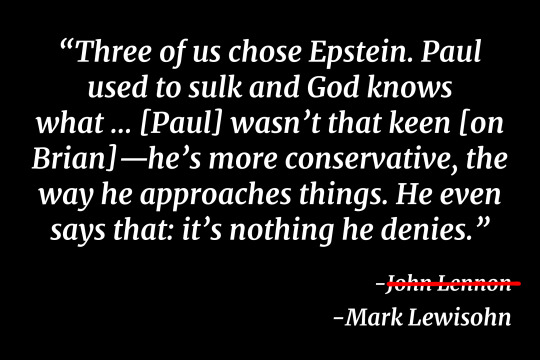
This is hella long, and that's because it's actually a full blog post. (In case you want it in a less monstrous form.)
A lot of people for a long time have put a lot of trust in Mark Lewisohn’s footnotes. Or at least in the fact of those footnotes. Because once you dig through them for any length of time you quickly discover that Mark Lewisohn’s footnotes hold secrets that would get him expelled from any undergraduate program. They reveal a “history” often contrived through a mass of Frankenquotes, ala carte creations, Lewisohn rephrased ‘paraphrases,’ and worse. For some parts of the narrative things aren’t too bad, yet in others monsters lurk around every corner. But this is not the sort of thing that’s graded on a curve, and it is past time to have a conversation about what standards should be accepted in Beatles’ scholarship.
Lewisohn lists his sources unlike most others. And his footnotes alone are more insightful than some other writers’ books. (Reddit, r/beatles)
I do not judge footnotes based on their insightfulness, nor do I want to single out a redditor, but I grabbed the comment because it’s an opinion that is widely shared and even accepted as canon. At least by people who have not combed those freakish footnotes. And while the pages of piled up sources do look fearsome en masse, a closer inspection reveals an offense to the truth, a threat to the record, and a blight on Beatles’ historiography.
“The rules for writing history are obvious. Who does not perceive that its chief law is never to dare say anything false, and never dare withhold anything true? The slightest suspicion of hatred or favor must be avoided. That such should be the foundations is known to all; the materials with which the building will be raised consist of facts and words.” –Cicero
A Look at Lewisohn’s Lab-created Frankenquotes
FIRST, WHAT ARE QUOTES? AND WHY ARE QUOTES?
Quotes are the soul and center of recorded—and recording— history.
And the rules around quotes and quotation marks are pretty simple. Most people, even if they’ve never written anything beyond a term paper, understand what quotation marks represent.
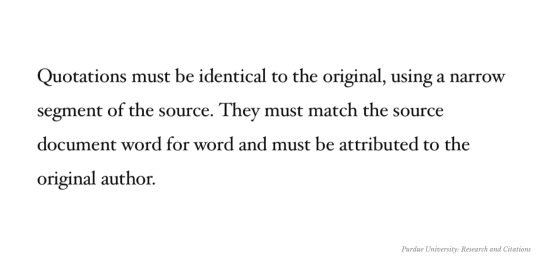
A set of quotation marks means, “This person said or wrote ‘these exact words’ at some given time.” You can smash a quote from two hours before or two years before right up against a separate quote to make your point—although it might get your grade lowered—but what you cannot do is take two different statements from two different times and make them seem like they are one statement.
When you put words inside one set of quotation marks you are stating, in black and white, that the identified person made this statement. That they said all those words together—or if you want to excise a reasonable part and use ellipses to represent that— as part of the same statement.
Look, combining two separate quotes that are not part of the same thought or topic is not a subjective issue. It is not an issue of controversy. Quotes are the bone marrow of written history. Quotes are the alpha and omega. In academic work or journalism they have to be, which makes sense as soon as you think about it. If it was cool for me to take a transcript and grab half a sentence from page 2 and half a sentence from page 17, push them together as if those words were spoken one after the other in a single thought, I bet I can manage to get those words to say almost anything I want.
Separate thoughts must be in two separate quotation marks. Separate. Somewhere between four sentences and a paragraph is widely accepted as the “two separate quotes” line, and there can be some ethical and technical wiggle room in a long rant by a person, but what makes all that subjective nonsense go out the window is if the quotes come from two separate questions. Or two separate days. That’s two quotes. Not hard.

Which again, makes sense if the point is conveying information to the reader and lessening the chance of a writer manipulating someone else’s words to express something that the person didn’t mean.
This is the contract inherent in a quote. These are the rules we all agree to and understand, and these are the reasons why. And there’s no reason to break them.
Why do you want me to believe that John said these two things at one time? What was wrong with what he did say?
THE FOUR MOST COMMON WAYS MARK LEWISOHN MAULS THE MEANING OF THE QUOTE:
The Basic Lewisohn Frankenquote 🧟♂️
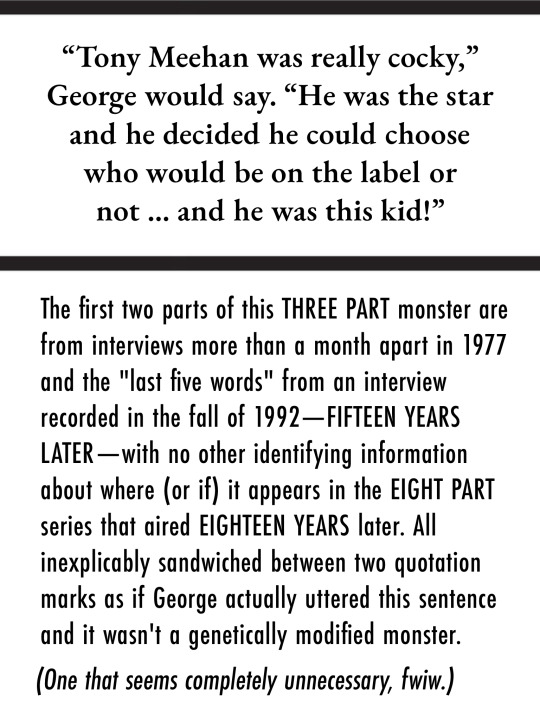
(“CONCLUDING FIVE WORDS FROM—” – I cannot even see the point of this THREE PART monster. Full footnote reads: 9) Author interview with Tony Meehan, September 6, 1995. (“I met George again in 1968 and for some reason he was harboring a grudge against me. He was very, very uptight about it—’You blocked us getting a recording contract …’ ”) First part of George quote from interview by Terry David Mulligan, The Great Canadian Gold Rush, CBC radio, May 30 and June 6, 1977; concluding five words from interview for The Beatles Anthology)
This three-headed monster attributed to George Harrison is a very dull little guy. Not particularly venomous. Just convenient, I guess. For whatever reason, Mark Lewisohn decided it was worth rummaging through the quote buffet until he collected enough pieces for George Harrison to say this thing. “…concluding five words from…” What are we even doing here? No, really. Please tell me.
And like a lot of the footnotes for these bespoke quotations, there are further problems. “[F]rom interview for Beatles Anthology”? An interview that aired? In one of the episodes? Can you narrow it down? I guess I’ll just have to listen very closely to them all and hope I don’t miss the five words.
But if we got bogged down in the sorts of trivial details that would immediately lose a college student a letter grade off a History 101 paper we would never get anywhere. We have to stick to the violent felonies.
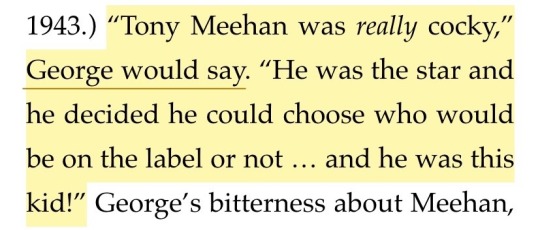
*Love the "George would say——" Uh, would he? Well, I guess after all that trouble you went to, he would now. It's really incredible how cavalier Lewisohn is about a Beatle's words.
These sorts of reconstituted, lab-engineered, made up “quotes” are shot throughout Tune In. “Quotes” made up of words from two, three, and even four sources, spoken months or often years apart.
Ala Carte Creations 🍱
It really is a buffet, and these ala carte creations come in all shapes and sizes. They might just be words that have been plucked up and glued back together to make something more useful to a particular narrative. (Ellipses or dash optional.)
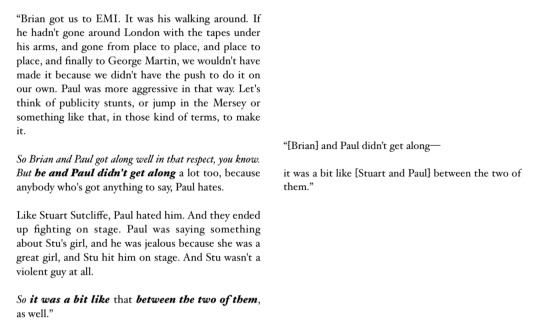
TUNE IN: “John saw a bigger picture, and it would be surprising if it wasn’t equally obvious, or made obvious, to Brian and George. He likened Paul’s enduring snag with Brian to his other long-standing difficulty: ‘[Brian] and Paul didn’t get along—it was a bit like [Stuart and Paul] between the two of them.’” (Footnote 37: Interview by Peter McCabe and Robert D. Schonfeld, September 1971)
Bonus 🍒 Phoebe's dramatic reading of John's original quote:
The Donut 🍩
Then there are a seemingly uncountable number of “quotes” with a sentence or three ripped out from the middle, but with zero representation that more words were ever there. (And in most of these particular deceptions, the simple representation of something excised (. . .) would make the quote fine. There are a lot of these, but they are also the easiest to fix.)

Chapter 10: “I was in a sort of blind rage for two years. [I was e]ither drunk or fighting. **It had been the same with other girlfriends I’d had.** There was something the matter with me.”
And then there are the true buffet bonanzas, words lifted and twisted beyond recognition until they say something brand spanking new.
However, John remembered Paul’s attitude to Brian being very different. John was always emphatic that Paul didn’t want Brian as the Beatles’ manager and presented obstacles to destabilize him, to make his job difficult … like turning up late for meetings. “Three of us chose Epstein. Paul used to sulk and God knows what … [Paul] wasn’t that keen [on Brian]—he’s more conservative, the way he approaches things. He even says that: it’s nothing he denies.”
The Lewisohn Remixes 🍸
And then there are the “paraphrases.” I couldn’t even begin to guess how many of these there are, and often they aren’t even paraphrases, but whole new Mark Lewisohn re-interpretations with quotation marks slapped around them. But if you don’t check, you probably won’t know, because like this Lewisohn rewrite of a well-known Mrs. Harrison quote, there’s a good chance you’ll recognize the bulk of it, making it less likely that you’ll catch the scalpel work excising Paul. And while I don’t want to get caught in the nooks and crannies of intent in an example like this one I have to say, just this once, that what has to be a purposeful excising of Paul to create a slightly new quote on one side, combined with a badly acted, bad faith—(or bad scholar)—“Where was Paul when John’s mom died?” on the other, is par for the course.
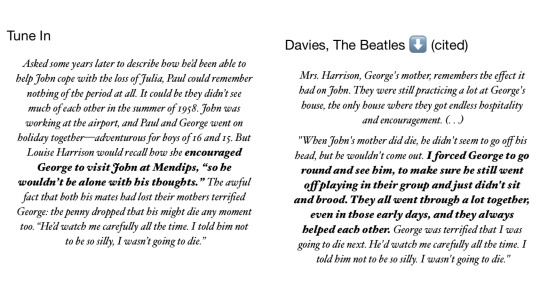
George Harrison’s mom’s made up Lewisohn rephrase which coincidentally removes Paul from the imagery.] ❦ LEWISOHN:“ Asked some years later to describe how he’d been able to help John cope with the loss of Julia, Paul could remember nothing of the period at all. It could be they didn’t see much of each other in the summer of 1958. John was working at the airport, and Paul and George went on holiday together—adventurous for boys of 16 and 15. But Louise Harrison would recall how she encouraged George to visit John at Mendips, “so he wouldn’t be alone with his thoughts.” ❦ DAVIES: “They were still practicing a lot at George’s house, the only house where they got endless hospitality and encouragement. . . . I forced George to go round and see him, to make sure he still went off playing in their group and just didn’t sit and brood. They all went through a lot together, even in those early days, and they always helped each other.”
Why do you have to slice and dice and reconstitute people’s words? No writer, and certainly no historian, should ever feel empowered to take words from a historical figure from two or three different places and topics and times, splice them together, and tell us, “Winston Churchill said this.” No he didn’t! Why are you so intent on changing the words of the people you’re writing about? What’s wrong with just using two different quotes?
You cannot take two or three quotes from two or three or even four separate statements, stick them between one set of quotation marks and say John or Paul or George or Joe Smith said this.
No they didn’t. They never said that. Why do you want me to think they did??
All these words are Abraham Lincoln’s, but this is not a Lincoln quote:
“Every man is said to have his peculiar ambition. Whether it be true or not, I can say for one that I have no other so great as that of — making a most discreditable exhibition of myself.”
(I kept it ridiculous, although I didn’t have to.)
But I want you, the reader, to be saying to yourself, “Okay, enough already. I get it!” Because in the last few days I have wandered too far into the weeds too many times and written far too many words detailing the multiplicity of ways Mr. Lewisohn does violence to each and every law of reporting historical facts, and could write many more. And I will post a more detailed list of the crimes against the quote that I am charging Mark Lewisohn with as we go forward, but I don’t think we need that now. The fact is that every fair-minded person knows what quotation marks represent, and there is no more fair-minded group of people than serious Beatles fans and scholars. And it is those fair-minded scholars who I want most to hear me. Whether you’ve written books or host a podcast or just know that you know a whole lot of stuff and take seriously your part of the trust in preserving the truth about The Beatles for us and future generations, it is you I am really talking to. My Cicero quoting-freaks. The ones who care about getting it right.
“The chief, the only, aim of style is to put facts in a clear light, with no concealment.”
- Lucian of Samosata
What footnotes can do, and what footnotes can’t.
You can list multiple sources in a single footnote. That’s not only fine, it’s correct. If I want to tell part of a story based on several sources, that often means several sources in a footnote. But not for one, single quote.
The problem isn’t the footnote, it’s the bioengineered quote on the page that you swept under a footnote hoping I wouldn’t notice.
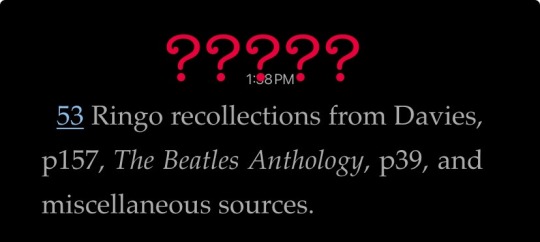
Which leads us to what a footnote is not. A footnote is not a post-hoc fixative for your textual sins. You cannot do whatever you want as long as you confess it in a footnote. A footnote is not a magic spell. A footnote is not the universally understood symbol for “I have my fingers crossed behind my back.” You cannot fix lies and misrepresentations in the footnotes. Footnotes aren’t for trying to chase down three different sources to match up which part of a manufactured “quote” someone said on which date. Footnotes are not the picture on the front of a puzzle box. I should not need to find corner pieces to figure out which of these George Harrison words were actually spoken together.
Footnotes are a truthful and independently verifiable record of primary sources. It’s that simple.
And taking Mark Lewisohn completely out of the picture for a moment, I feel sure we can all agree that neither John Lennon nor Paul McCartney nor George Harrison nor Ritchie Starkey would want anyone rearranging their words as if they were guitar chords. You wouldn’t take three-quarters of Penny Lane and one-quarter of Across the Universe, put them together and call it a Beatles‘ song. So don’t take three quarters of John to Jann Wenner and one-quarter of John to Lisa Robinson, put them together and call it a Beatle’s quote.
MY PERSONAL STANDARD IS THAT IF SOMEONE REPRESENTS, “A BEATLE SAID THIS,” IT BETTER DAMN WELL BE SOMETHING A BEATLE SAID.
None of the Beatles, dead or alive, would be cool with their words being taken out of context at all, let alone two or three different statements on god knows what being combined into one. This isn’t hard, though. Use two or three separate quotation marks, and don’t take statements out of context. Don’t mix and match their words, but don’t twist them, either. If a person said something, it is the historian’s duty to represent those words to the best of your ability, and then use them to tell a factual story focused on what you feel is important. Staying true to the original words and true to their meaning. If you can’t use those words without twisting them, then change your story to fit their words, not the other way around. If their statement helps tell the story your way, use it! For goodness sake, John Lennon said at least two opposing things about almost every topic on earth, so there should be enough to choose from without being deceptive. I actually want the truth. Don’t you?
Biography is story based around accurately represented, trustworthy and verifiable facts. And look, Beatles fans, whoever your favorite is: we are not going to get the truth about his history if we don’t learn to take these things seriously. Let’s have—if not high standards—at least the lowest generally accepted standards. In the mid-term we need a lot more Beatles scholars with a lot more points of view, and now—right now—we need experienced Beatles scholars to prioritize searching out and finding smart, interested people to mentor. And we simply must ensure that we aren’t allowing to solidify into stone “facts” that are not facts and statements no one ever made. I don’t think any honest Beatles fan—(which rounds up to all of them)—wants any question around that issue.
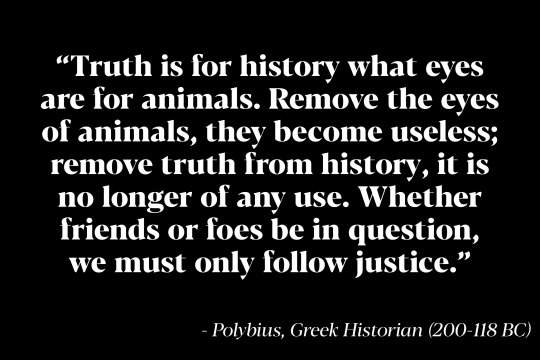
The record is the most important thing. Now, and always. This is not about John versus Paul. John versus Paul may live on always in our hearts, but for Beatles history, it’s the wrong question. I’d rather someone be up front about their loves, but in the end the focus should be on representing the primary facts in their most pristine form. Love who you love most, but place truth above all. Pristine facts. Pristine quotes. Nothing hidden. Nothing misrepresented.
Let the historical actors speak for themselves. That is their right.
And the historian’s duty.
NEXT, WE DISSECT A MONSTER.

Final note: I became frustrated and (maybe strangely) offended by Lewisohn's obscene pretenses in 2020, but my frustrations were nebulous and unfocused until this incredible AKOM series. I feel much better now. Angrier. But better. They worked their asses off. 🥂
#lewisohn#akom#the beatles#tune in#fine tuning#frankenquotes#lewisohn's monsters#historiography#paul mccartney#john lennon#george harrison#ringo starr#mark lewisohn#a beatle never said that#beatles#brian epstein#allen klein#Spotify
170 notes
·
View notes


